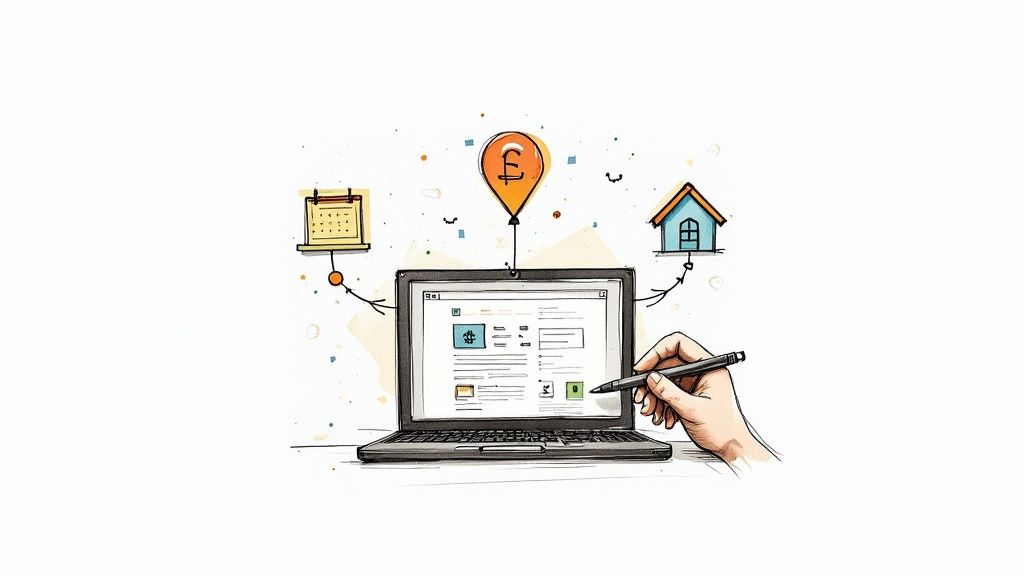
direct booking website
Build a Successful Short-Term Rental Direct Booking Website
Posted on Oct 18, 2025

A short-term rental direct booking website is your own personal storefront. It's the place where guests can book with you directly, completely sidestepping big platforms like Airbnb or Vrbo. This move gives you the keys to the kingdom—total control over your brand, your business, and your bottom line. Forget those painful OTA commission fees. This is the single most powerful way to build a rental business that lasts.
Why You Need a Direct Booking Website Now
Relying completely on Online Travel Agencies (OTAs) is like building a beautiful house on someone else's land. Sure, platforms like Airbnb and Vrbo are fantastic for getting eyeballs on your property, but they own the guest relationship, they make the rules, and they take a hefty slice of your revenue.
Launching your own direct booking site is the most important step you can take towards building a resilient, profitable, and truly independent business.
The biggest driver is, of course, the money. OTAs are known for charging commissions and fees that can easily eat up 15% or more of every single booking. By shifting even a small portion of your reservations to your own site, that money goes straight into your pocket. You can even offer guests a slightly better rate and still increase your profit margin. It's a genuine win-win.
Beyond Commission Savings
But the perks go way beyond just saving on fees. When you own your booking channel, you stop being just another listing and start becoming a real brand.
- Full Brand Control: You get to decide the entire look, feel, and voice. Your website becomes a reflection of your unique hospitality style, not a cookie-cutter OTA template.
- Direct Guest Communication: This is huge. You can finally build real relationships. Collect emails for future marketing, offer personalized upsells, and encourage repeat stays without a middleman listening in.
- Ownership of Policies: You're in charge. You set your own cancellation rules, payment schedules, and house policies, free from the whims of an OTA's constantly shifting terms of service.
- Data-Driven Decisions: With access to your own website analytics, you can finally see how visitors behave, track how well your marketing is working, and make smart, informed decisions to grow.
Think about this for a second: an OTA decides to tweak its algorithm overnight, and your property's visibility tanks. It happens. With a direct booking site, you have a stable, reliable source of traffic and income that you control, protecting your business from that kind of platform volatility.
Building a Sustainable Future
A direct booking website isn't just a tool; it's a long-term asset. It's how you build a loyal tribe of repeat guests who know your brand, trust you, and book with you again and again.
This fundamentally changes the game. Your marketing costs go down over time, and you create a predictable stream of revenue. Instead of constantly fighting for new eyeballs on crowded platforms, you can focus on what you do best: delivering an incredible experience that keeps guests coming back directly to you. That's how you secure your business's health and profitability for the long haul.
Choosing the Right Tech for Your Booking Platform
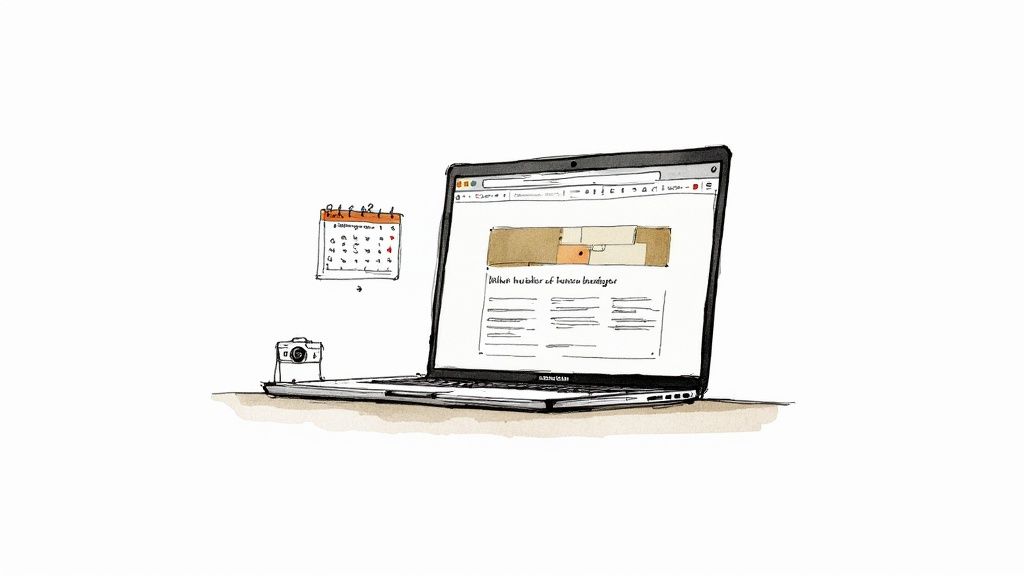
Before you start picking out color schemes and fonts, you've got to nail down the technical foundation for your short-term rental direct booking website. Getting this right from the start will save you countless headaches down the road. The good news? You have more options than ever, whether you're a tech wizard or just starting out.
Your first big decision boils down to two main paths: using a general website builder or going with specialized, all-in-one software built for rentals. Each has its own set of pros and cons, and the best choice really depends on your goals and how hands-on you want to be.
General-purpose builders like Squarespace or Wix are fantastic for their user-friendliness. They make it incredibly simple to get a beautiful, professional-looking site online fast with drag-and-drop tools and slick templates. But they aren’t built for vacation rentals out of the box. You'll have to bolt on third-party booking plugins and manually wrestle with calendar syncing, which can quickly turn into a logistical nightmare.
All-in-One Platforms vs. Website Builders
This is where specialized platforms come in. Tools like Lodgify, OwnerRez, or Guesty are designed from the ground up for hosts. They roll a website builder, a powerful booking engine, a channel manager, and payment processing into a single, cohesive system. Yes, they usually have a higher monthly fee, but they solve some of the biggest operational puzzles for you automatically.
Website Builders (e.g., Squarespace, Wix)
- Pros: Total design freedom, lower upfront costs, and great for building a brand-heavy site.
- Cons: You'll need separate booking plugins, you risk double bookings without a solid channel manager, and getting all the pieces to talk to each other can get technical.
All-in-One Software (e.g., Lodgify, Hostaway)
- Pros: Comes with a built-in booking engine and channel manager, automates calendar syncing, and keeps your operations tidy.
- Cons: Less creative control over the design compared to a general builder, and you'll be paying a higher subscription fee.
If you're looking for a more detailed breakdown, our guide on the best website builder for vacation rentals compares the top options to help you make the right call.
Your Essential First Steps
No matter which platform you land on, there are a couple of non-negotiable first steps to get right. These will set a professional tone and start grabbing guest attention from day one.
First up, buy a professional domain name. Something like TheMountainViewCabin.com is infinitely more memorable and trustworthy than a generic subdomain from your website builder. Think of it as your digital address—it's a core piece of your brand.
Next, get your assets in order. I'm talking about high-quality, professional photos and property descriptions that tell a story. These are the lifeblood of your website and will do most of the heavy lifting when it comes to turning lookers into bookers.
The market is undeniably shifting online, with projections showing nearly 60% of all short-term rental bookings will happen digitally. If you can move just 10–20% of your bookings to a direct site, you can seriously boost your income by dodging OTA fees, which often run between 12–20%. That's a huge financial incentive to get your tech stack right from the very beginning.
Designing a Website That Turns Visitors Into Guests
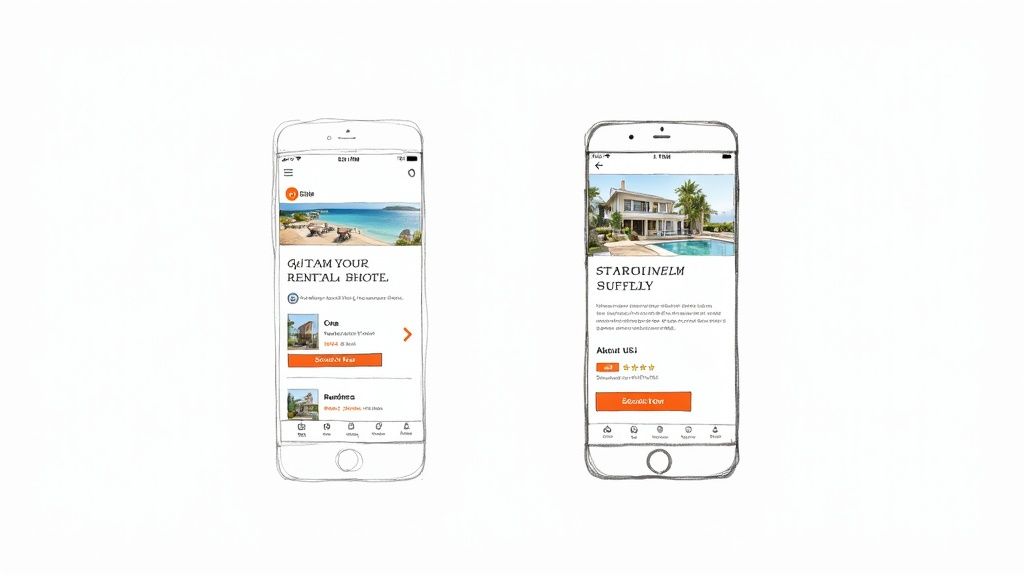
Having a beautiful website is a great start, but that's only half the job. Its real purpose is to turn casual lookers into confirmed guests. For your short-term rental direct booking website to actually make you money, every single element has to work together to guide people from browsing to booking.
This isn't just about looking good. It’s about creating a website that’s intuitive, trustworthy, and incredibly simple to navigate.
The whole process starts with a dead-simple user experience. Let's be honest, potential guests have the attention span of a goldfish. If they can't figure out how to check your availability or see pricing in a few seconds, they’re gone. Your calendar needs to be front and center, and that "Book Now" button should be the most obvious thing on the page.
And here’s a reality check: with over 60% of travel searches happening on phones, a mobile-first design isn't just a good idea—it's essential. Your site has to look and work flawlessly on a smartphone, which means fast-loading pictures and big, easy-to-tap buttons.
Crafting Compelling Property Pages
Think of your individual property pages as your digital sales pitch. This is where you stop listing specs and start telling a story that helps a guest picture themselves kicking back in your space.
Don't just say "3 bedrooms, 2 baths." Paint a picture. Try something like, "Wake up to stunning mountain views from the master suite's private balcony." You're selling an experience, not just a room count. This is the kind of emotional hook that separates your listing from a generic one on a big OTA.
Your photo gallery? That's your most powerful weapon. Please, invest in professional photography. It makes a world of difference. Make sure you get a good mix of shots:
- Wide-angle photos that show off the whole room.
- Detail shots of the little things that make your place special, like a high-end coffee maker or cozy, premium linens.
- Exterior and neighborhood photos to give them a feel for the area and what's nearby.
Building Unshakeable Trust
Booking directly with a host instead of a giant corporation requires a leap of faith. Your website needs to build that trust from the second the page loads, using clear signals that you're credible and professional.
A potential guest is essentially sending a stranger a large sum of money. Your website's design must immediately reassure them that their booking is safe and that you are a legitimate, professional host. Every element should reinforce this feeling of security.
Here are a few non-negotiable trust signals you need to have:
- Guest Reviews: Plaster your best reviews all over the site. Social proof is ridiculously powerful.
- Secure Payment Badges: Display logos for payment systems like Stripe or PayPal. It’s a simple visual cue that tells them their financial info is safe.
- An "About Us" Page: Tell your story! A friendly face and a little bit about who you are makes your business feel human and much more trustworthy.
Ultimately, getting more bookings comes down to understanding how to improve website conversion rate with proven design strategies. If you want to go even deeper on this topic, our guide on vacation rental website design has tons of specific tips. When you combine great storytelling with solid trust signals, your website won't just attract visitors—it'll confidently turn them into happy guests.
Must-Have Features for Your Direct Booking Engine
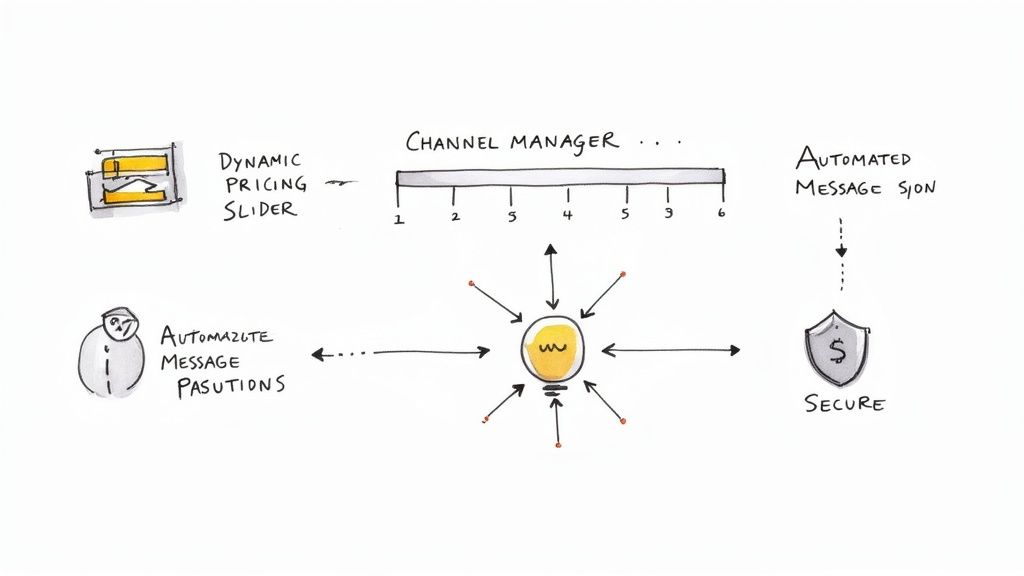
To build a direct booking website that actually works, you need more than a pretty design and a "Book Now" button. The real magic happens under the hood. The software you choose is what turns your site from a simple online brochure into an automated, money-making machine that saves you a ton of time.
Think of it this way: your website is the storefront, but the booking engine is the entire back-of-house team. It's your receptionist, your revenue manager, and your communications director, all working 24/7. This is the key to scaling your business without pulling your hair out.
Seamless Channel Management
If you're listing on OTAs like Airbnb or Vrbo—which you absolutely should be—then a channel manager isn't just a "nice-to-have." It's non-negotiable. This feature is the central hub for your calendar, instantly syncing your availability everywhere.
Without it, you're just asking for a double booking. Imagine a guest books a week directly on your site, but before you can race over to Airbnb to block those dates, someone else snags the same weekend. Now you’ve got a massive headache, an angry guest, and a black mark on your reputation. A good channel manager makes that nightmare scenario impossible.
An integrated channel manager is your single source of truth for availability. It prevents the operational chaos and reputation damage of double bookings, which is one of the biggest risks hosts face when managing multiple booking platforms.
Dynamic Pricing and Automation
Are you still using set-it-and-forget-it pricing? You're leaving a lot of money on the table. A modern booking engine needs to either have dynamic pricing built-in or play nicely with tools that do. These platforms analyze market data—local demand, holidays, big events, and what your competitors are charging—to adjust your rates automatically.
This means you can cash in on that big concert weekend and stay competitive during the slow season, all without having to obsessively check calendars yourself. It’s about letting the tech optimize your revenue while you focus on bigger things.
And it's not just about pricing. Guest messaging is another area where automation is a game-changer. Your booking engine should handle the essentials without you lifting a finger:
- Booking Confirmation: Fired off the second a guest pays.
- Pre-Arrival Instructions: Emailed a few days before check-in with access codes and directions.
- Post-Stay Review Request: A gentle nudge asking for feedback after they leave.
This isn't just about saving time; it's about delivering a polished, professional experience that guests remember.
Integrated and Secure Payments
Taking payments directly can feel a little scary, but a quality booking engine makes it simple and bulletproof. Look for a system with a built-in, PCI-compliant payment gateway. Most of the top players use trusted processors like Stripe or PayPal to handle the heavy lifting.
This is a huge factor in building guest trust. When a potential guest sees a secure, familiar payment option, they’re far more likely to enter their credit card details. The system should handle the whole transaction, from the initial deposit to the final balance, keeping both you and your guests safe. Don't even consider a platform that makes you manually handle credit card numbers.
Comparison of Key Booking Engine Features
Choosing the right software can be overwhelming, as each platform has its strengths. Below is a quick comparison to help you see how popular options like OwnerRez, Lodgify, and Hostfully stack up on these critical features.
| Feature | Booking Engine A (e.g., OwnerRez) | Booking Engine B (e.g., Lodgify) | Booking Engine C (e.g., Hostfully) |
|---|---|---|---|
| Channel Manager | Robust, two-way API sync with major OTAs | Built-in, with templates for different channels | Strong integration, focused on syncing guides |
| Payment Gateway | Integrates with Stripe, PayPal, and others | Lodgify Payments (powered by Stripe) & others | Stripe and PayPal integration |
| Automation Tools | Advanced triggered messaging and review requests | Automated emails and scheduled messages | Centralized inbox with automated templates |
| Pricing Engine | Supports third-party dynamic pricing tools | Basic rule-based pricing adjustments | Connects with tools like PriceLabs & Wheelhouse |
Ultimately, the best choice depends on your specific needs—whether you prioritize advanced automation, an all-in-one payment solution, or deep integrations with other tools. Use this as a starting point to dig deeper into what will work best for your business.
Marketing Your Site to Get Your First Direct Bookings
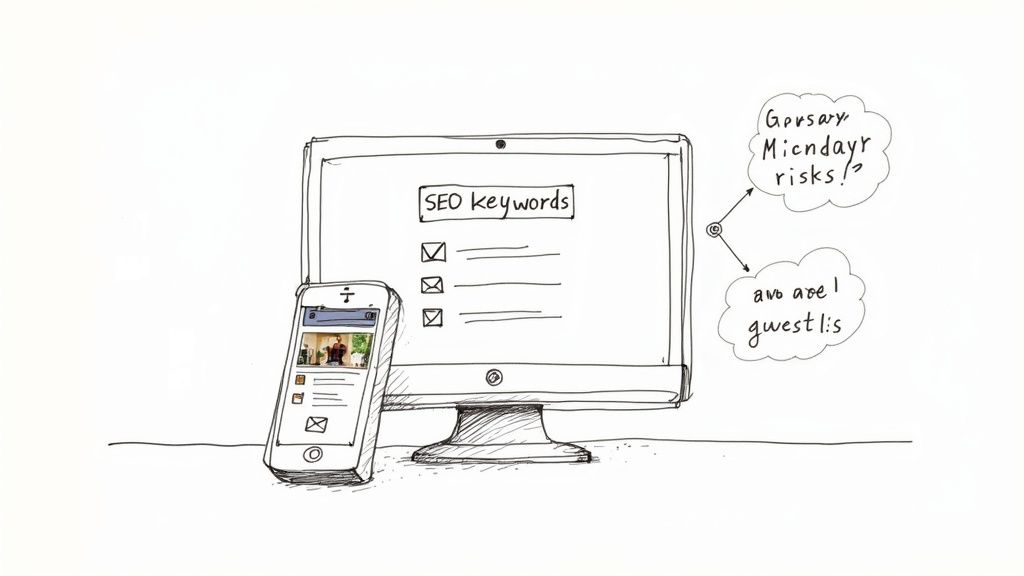
Alright, your new direct booking website is live. Pop the champagne, but don't kick your feet up just yet. The real work is just getting started. A beautiful website is useless if no one ever sees it, so now it's time to shift gears into marketing mode.
You don't need a massive budget to get those first commission-free bookings. What you need is a smart, targeted strategy. Think of your website as the destination and your marketing as the roadmap guiding travelers right to your virtual front door. The best place to start? With the guests who are already looking for a place just like yours.
Laying Your SEO Foundation
Search Engine Optimization (SEO) is hands-down your most powerful tool for attracting free, organic traffic. It all starts with getting your property pages right. You have to go way beyond the basic descriptions and start thinking like a traveler. What words would they actually type into Google?
For example, instead of just "3-bedroom cabin," get specific. Try something like "pet-friendly cabin near hiking trails in Asheville." That level of detail helps you show up for those longer, more specific search phrases—what we call long-tail keywords—that high-intent travelers use.
One of the quickest wins for local SEO is setting up a Google Business Profile. It's completely free and puts your rental right on Google Maps. Suddenly, you're visible to anyone searching for accommodations in your specific area.
This one simple step legitimizes your business and starts capturing that valuable local search traffic. It’s a non-negotiable first step for any short-term rental direct booking website. If you're hungry for more ideas, we've put together a whole guide on how to drive direct bookings for your vacation rentals.
Harnessing Social Media and Email
Social media is where you can stop being just a property and start becoming a brand. Don't just post sterile photos of empty rooms. You need to sell the experience. Show people what it feels like to be there.
Post a quick video tour of the backyard fire pit at sunset. Share a photo of your favorite local coffee shop just down the street. This is how you help potential guests picture themselves making memories at your place.
Visual platforms are particularly powerful here. For instance, using Pinterest can be an incredible way to drive visitors to your booking site. There are entire strategies built around using Pinterest for Website Traffic, and it's especially effective with younger travelers.
Millennials and Gen Z are a huge driving force in short-term rental demand, and they often find their next getaway scrolling through social media. With Airbnb listings up 62% since 2020, you have to stand out. Building a unique brand on these platforms is how you capture the attention of this digital-native audience.
Finally, don't overlook your most valuable marketing asset: your past guests. Start building an email list from day one. This gives you a direct line to people who already know, like, and trust your property.
Send out an occasional newsletter with a special discount for repeat stays or a heads-up about upcoming local events. This is the ultimate advantage of owning your guest data—it lets you build real loyalty and drive repeat business for years, completely free of OTA commissions.
Common Questions About Direct Booking Websites
Deciding to build your own direct booking platform is a big step, and it's totally normal to have a few questions swirling around. Breaking into the world of direct bookings can feel like a huge undertaking, but once you understand the common hurdles, the whole thing becomes a lot less intimidating. Let's tackle some of the most frequent questions I hear from hosts.
One of the first things everyone asks about is the cost. The good news is, creating a short-term rental direct booking website doesn't have to break the bank. You can find a solution for almost any budget.
If you're willing to get your hands dirty, a DIY setup using a website builder and a booking plugin can run as little as $50-$100 per month. For something more robust, dedicated all-in-one platforms built for hosts typically range from $30 to over $200 monthly, mostly depending on your property count. A fully custom site will cost thousands upfront, but most hosts find that sweet spot with a subscription-based tool that delivers professional results without the sticker shock.
Should I Still List On OTAs?
This is a big one. Many hosts think that launching a direct booking site means they have to say goodbye to Airbnb or Vrbo. The answer is a hard no—you should absolutely keep your OTA listings active.
For most hosts, a direct booking site is a powerful supplement, not a replacement. Use the massive marketing reach of the OTAs to attract new guests, then convert them into loyal, repeat bookers who reserve directly with you for their next trip.
This hybrid approach really gives you the best of both worlds. The secret to pulling this off without descending into scheduling chaos is a channel manager. This is a non-negotiable feature in any good booking software; it automatically syncs your calendars across all your platforms in real-time, completely wiping out the risk of double bookings.
How Do I Handle Payments Securely?
The idea of handling payments on your own can be nerve-wracking, but modern booking engines make it incredibly safe and straightforward. There's one golden rule here: never handle or store credit card information yourself.
Instead, you’ll lean on a trusted, integrated payment gateway. The best booking platforms connect directly with services like Stripe or PayPal. These processors are PCI compliant, which is the industry standard for protecting financial data.
Using a gateway like Stripe gives you a few key advantages:
- Builds Trust: Guests see names they recognize and feel much more comfortable entering their payment details.
- Reduces Your Liability: The gateway handles all the sensitive data, so you’re not on the hook for major security risks.
- Automates Transactions: Payments, refunds, and even security deposits are all processed automatically, saving you a ton of time.
By integrating a secure payment processor, you offer a professional and safe booking experience that protects everyone involved.
Ready to build a powerful direct booking website that drives revenue and builds your brand? hostAI offers intelligent tools like hostFront to create a stunning, high-converting site with ease. Start building your direct booking engine with hostAI today.